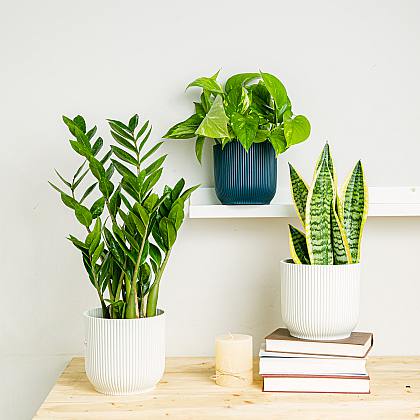Learn how to protect your plants from the cold during the winter with our practical tips
In this article, you'll learn how to protect your plants from the cold during the winter with our practical tips. You'll discover the importance of protecting your plants from cold temperatures, as well as basic tips for winterizing them
In this article, you'll learn how to protect your plants from the cold during the winter with our practical tips. You'll discover the importance of protecting your plants from cold temperatures, as well as basic tips for winterizing them. We'll also give you specific recommendations to protect both outdoor and indoor plants from the cold. You'll learn how to water your plants in winter without damaging them and what to do if they suffer cold damage. In addition, we will teach you how to take care of your plants after winter to ensure their health and vitality. Read on for valuable tips on how to keep your plants protected during the winter season!
Why is it important to protect your plants from the cold?
Protecting plants from the cold is crucial for their survival during the winter. cold temperatures can seriously damage the leaves, branches, and roots of plants, which can lead to their death. In addition, frost and snowfall can cover plants with a layer of ice that impedes the circulation of water and nutrients, which can also be fatal for them. For this reason, it's important to take steps to protect your plants from the cold during the winter months.
It is especially important to protect outdoor plants, as they are directly exposed to adverse weather conditions. Houseplants also need protection, although to a lesser extent, as indoor temperatures are usually warmer.
Some basic steps you can take include pruning dead or diseased branches before winter, covering plants with special blankets or fabrics to avoid direct exposure to cold and wind, and watering them sparingly to prevent water from freezing at their roots. It's also important to regularly check your plants for any signs of cold damage and act quickly to remedy them.
In short, protecting your plants from the cold is essential to ensure their survival during the winter months. With a few practical tips and a little regular attention, you can ensure that your plants survive the winter and bloom in the spring.
Basic Tips for Winterizing Your Plants
To prepare your plants for winter, it's important to start by making an assessment of their condition. Check each plant carefully to identify any damage or diseases that need to be treated before the cold weather arrives. In addition, it is essential that you carry out a deep cleaning of the pots and planters, removing dry leaves and soil debris to prevent the accumulation of moisture and fungi. Once you've cleaned and checked your plants, it's time to fertilize them. Choose an organic fertilizer and apply it in the right amount according to the manufacturer's instructions. This will help strengthen the roots and prepare them to withstand cold temperatures.
Another key aspect of winterizing your plants is watering. As temperatures drop, it is necessary to decrease the amount of water that plants receive, as excess humidity can favor the appearance of fungal diseases. Therefore, it is advisable to water them less frequently, but in greater quantities. That is, you need to make sure that the water reaches the roots and soaks the soil well.
Finally, it's important to place your plants in a suitable location during the winter. Outdoor plants need to be protected from bitter cold and strong winds, so you can use special covers such as fabrics or plastics to protect them. In the case of indoor plants, try to place them in a place with good ventilation and natural lighting. By following these basic tips, you'll be able to winterize your plants and ensure that they survive cold temperatures without any problems.
How to Protect Outdoor Plants from the Cold During the Winter
To protect your outdoor plants from the cold during the winter, it's important to take some preventative measures. First of all, make sure that the plants are well watered before the cold weather arrives, as moist soil helps retain heat. In addition, it is advisable to cover the plants with special blankets or fabrics to protect them from low temperatures and frost. Make sure the covers don't directly touch the leaves or branches of the plants, as this could damage them. You can also use physical barriers, such as fences or walls, to protect your plants from the cold wind. Another option is to move the pots to a more sheltered location, such as a greenhouse or covered porch. Additionally, it is important to avoid pruning plants during the winter, as this can weaken them and make them more susceptible to cold. Remember to periodically check your plants for signs of cold damage, such as wilted leaves or black spots, and act quickly if necessary. By following these practical tips, you can effectively protect your outdoor plants during the colder winter months.
How to Protect Houseplants from the Cold During the Winter
If you have houseplants, it's important to know how to protect them from the cold during the winter. To start, make sure to place them in an area of the house where they get enough sunlight and away from cold drafts. In addition, it is advisable to keep the temperature of the room between 15 and 25 degrees Celsius to avoid sudden changes in temperature that can damage them.
Another practical tip is to water them sparingly and prevent water from accumulating in the dishes or pots, as excess moisture can lead to root and leaf diseases. You can also spray water on the leaves to increase ambient humidity and protect them from the dry, cold winter environment.
If you have heating at home, it's important to avoid plants near radiators or direct heat sources, as this can dry them out and cause them to lose leaves or even die. Instead, you can place them on a plate with damp stones to increase the ambient humidity around them.
Finally, if you notice that any plant is starting to suffer from the effects of the cold, such as yellowing or wilting leaves, it is important to act quickly. You can move it to a warmer area protected from the cold or cover it with a light cloth overnight to prevent it from getting too cold. By following these practical tips, you will be able to protect your houseplants from the cold during the winter and enjoy their beauty and freshness all year round.
How to Water Plants in Winter Without Damaging Them
Watering plants in winter can be challenging, as the cold can affect water and nutrient uptake. It is important to water them correctly to avoid damaging them. The first thing to keep in mind is that plants need less water in winter due to their growth slowing down. Therefore, it is not necessary to water them as often as in other seasons. It is also important to water them during the warmest hours of the day, when the temperature is higher and the water is better absorbed. It is advisable to avoid watering the plants during the colder hours of the night or early morning, as the water can freeze and damage the roots of the plants. Additionally, it's important not to overwater, as overwatering can lead to fungal diseases and root rot. To avoid this, it's best to water lightly and make sure the soil is well-drained to prevent water buildups. In short, to water your plants in winter without damaging them, make sure to water them less frequently, during the warmest hours of the day and avoid overwatering. With these handy tips, you'll be able to keep your plants healthy and protected during the winter.
What to Do If Your Plants Suffer Cold Damage
If your plants are suffering from cold damage, it's important to act quickly to help them recover. First, assess the extent of the damage. Remove any parts of the plant that are completely wilted or damaged, as this can prevent spoilage from spreading. It then provides a warm and protected environment for your plants. You can move them to a covered location, such as a greenhouse or a room with good natural lighting. You can also use blankets or plastic wrap to cover plants outdoors during colder nights. Be sure to remove the coatings during the day to allow the plants to breathe and receive sunlight. In addition, it is important to properly water cold-damaged plants. Avoid overwatering, as too much moisture can make the situation worse. Instead, water moderately but regularly, making sure the water reaches the roots. Finally, it provides additional nutrients to your plants to aid in their recovery. You can use organic fertilizers or specific supplements to stimulate growth and strengthen the plants' defenses. Remember to be patient, as recovery can take time. By following these practical tips, you can help your plants overcome cold damage and enjoy a healthy and beautiful garden all year round.
How to care for Your Plants After Winter
After winter, it's important to take care of your plants so that they recover and grow healthily. Here are some practical tips to ensure the well-being of your plants after the cold season. First, perform gentle pruning by removing damaged or dead branches. This will allow the plant to focus its energy on the strongest, healthiest parts. In addition, it is advisable to remove any remaining dry or fallen leaves around the plant, as they can become a refuge for pests or diseases. Next, fertilize the soil with an organic fertilizer to provide additional nutrients to the roots and promote vigorous growth. Remember to water your plants sparingly, avoiding overwatering that can lead to root diseases. It is also important to regularly monitor the presence of pests and diseases, treating them with natural products if necessary. Finally, take a close look at your plants' growth and remove any grasses or weeds that may compete for soil resources. By following these simple tips, your plants will be ready to bloom and grow during the upcoming spring season.
We hope these practical tips have been helpful to you in protecting your plants from the cold during the winter. Let's always remember the importance of preparing our plants for low temperatures and keeping them hydrated without damaging them. Taking care of our plants is a task that requires patience and dedication, but the results are worth it. In this regard, have you ever considered the positive impact that plants have on our environment? In addition to their aesthetic beauty, plants are essential for purifying the air and reducing stress. Let's reflect on how we can integrate more plants into our lives and continue to learn how to care for them responsibly. Let's keep farming!


